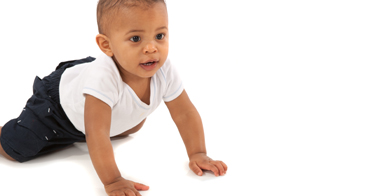Remember to do these things before your toddler starts crawling

12 Mar 2017
The most common injuries for little toddlers include falls, burns and scalds, water hazards and poisons. Make sure you plan for this and are prepared ahead of time – because when baby starts to move, you will be running after him or her and won’t have as much time on your hands to baby-proof your home.
The Cuddlers team have collected a few helpful tips to help you prepare your home for your little toddler.
1. Falls
When your baby starts crawling, and later walking, putting padding on sharp corners and edges of furniture can prevent eye or head injuries. Stabilise or remove unstable furniture or anything that may topple over if your baby grabs it – things such as standard lamps and vases are items to consider removing from your child’s environment. Fitting safety barriers at the top and bottom of stairs and the edges of decks and back doors is the first thing to do for a baby-safe house. It is also good to note that the safest place to change a nappy is on the floor.
2. Burns and Scalds
Always run cold water into the bath before adding hot water and remember to keep the bathroom and toilet doors shut. On the subject or doors, make sure to secure your oven door, so that little hands don’t go exploring inside while you are cooking your roast chicken.
Never have a hot drink around you while your child is in your lap or arms. Remember, toddlers have lots of energy; all it takes it an excited laugh for that drink to be kicked out of your hands and land on your little child. Tablecloths are a no-no in a baby-safe house. They can be very dangerous; one tug can tip the contents of the table onto your child.
3. Water Hazards
Water is always a potential death trap – a baby can drown silently in less than two minutes and in as little as 4 cm of water. Always empty the bath as soon as you have finished with it and never leave baby in the bath unsupervised – not even if the telephone rings! Don’t forget to use a non-slip mat on the bottom of the bath to prevent slipping.
Make sure your swimming pool fencing and netting complies with the bylaws, yes – in South Africa you need both a net and a fence and make sure you empty paddling pools after use.
Buckets that are used to collect rain water, or used to distribute grey water, should be kept in a section of the house your toddler does not have access to.
4. Poisons
All poisons, including household cleaners, dishwasher powder and medicines, should be locked away in a baby-safe home. Remember to supervise your baby when you’re in other people’s homes – never assume they have prepped their house to accommodate your child.